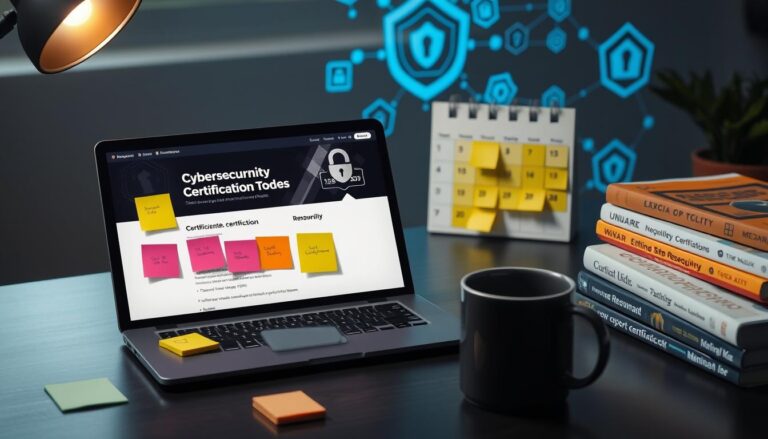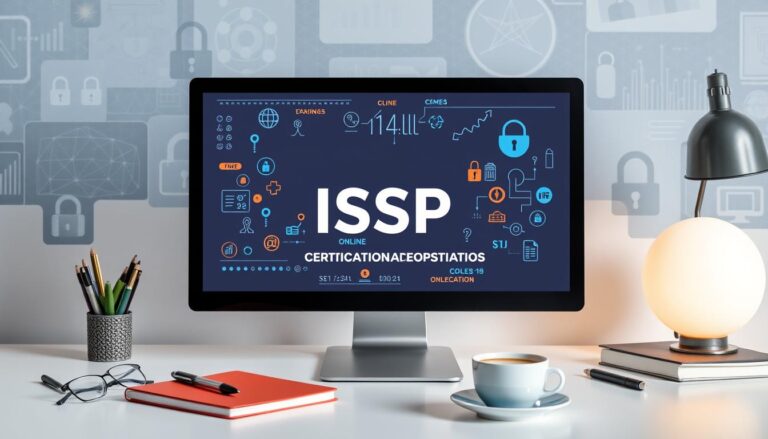
A computer with a certification seal in the background
If you’re looking to start or advance your career in information security, CISSP certification can help you achieve your goals. CISSP stands for Certified Information Systems Security Professional, and it’s considered a gold standard credential in the information security industry. CISSPs have a deep understanding of security principles, practices, and technologies, and they are recognized for their expertise, integrity, and commitment to excellence.
What is CISSP and Why is it Important?
CISSP is a certification offered by the International Information System Security Certification Consortium (ISC)². ISC² is a non-profit organization that specializes in information security education and certification. The CISSP certification demonstrates that you have the knowledge, skills, and experience to design, implement, and manage an effective information security program according to industry best practices and standards.
The CISSP is important because it’s a requirement for many high-level information security jobs, including security analyst, security engineer, security architect, security consultant, and chief information security officer (CISO). In addition, CISSP-certified professionals typically earn higher salaries and have more job opportunities than non-certified professionals.
Furthermore, the CISSP certification is recognized globally and is highly respected in the information security industry. It is a rigorous certification that requires a minimum of five years of professional experience in the field of information security. The certification covers a wide range of topics, including security and risk management, asset security, security engineering, communication and network security, identity and access management, security assessment and testing, security operations, and software development security.
The Benefits of CISSP Certification
CISSP certification offers a variety of benefits, including:
- Increased marketability and credibility
- Greater earning potential
- Enhanced job opportunities and career advancement
- Membership in a prestigious global community of information security professionals
- Growth in knowledge, skills, and confidence in information security
Additionally, CISSP certification provides a comprehensive understanding of information security, covering topics such as access control, cryptography, and network security. This knowledge can be applied to various industries and sectors, making CISSP holders valuable assets to organizations seeking to protect their sensitive information. Furthermore, CISSP certification requires ongoing education and professional development, ensuring that certified professionals stay up-to-date with the latest trends and best practices in information security.
What to Expect from a CISSP Training Course
CISSP training courses are designed to prepare you for the CISSP certification exam. The training covers the eight domains of the CISSP Common Body of Knowledge (CBK), including:
- Security and Risk Management
- Asset Security
- Security Architecture and Engineering
- Communication and Network Security
- Identity and Access Management (IAM)
- Security Assessment and Testing
- Security Operations
- Software Development Security
The training usually includes lectures, hands-on exercises, practice exams, and study materials. The duration and format of the training may vary depending on the provider. Some providers offer online training, while others offer in-person training in a classroom or corporate setting.
One of the benefits of taking a CISSP training course is that it can help you develop a deeper understanding of information security concepts and best practices. This can be especially valuable if you are new to the field or looking to expand your knowledge beyond your current role.
Additionally, many CISSP training courses offer networking opportunities with other professionals in the field. This can be a great way to build relationships, share knowledge, and potentially even find new job opportunities.
Top CISSP Training Providers in Manassas Park, VA
If you’re looking for CISSP training in the Manassas Park, VA area, you have several options to choose from. Here are some of the top CISSP training providers:
- New Horizons Computer Learning Center
- InfoSec Institute
- Global Knowledge
- SANS Institute
- ISACA
It’s important to note that each of these training providers offers different types of CISSP training, including in-person classes, online courses, and self-paced study options. Additionally, some providers may offer specialized training in certain areas of CISSP, such as risk management or security engineering. Before choosing a training provider, it’s important to research and compare the different options to find the one that best fits your learning style and career goals.
How to Choose the Right CISSP Training Course for You
When choosing a CISSP training course, it’s important to consider your learning style, schedule, budget, and career goals. Here are some factors to consider:
- The provider’s reputation and accreditation
- The instructor’s experience and credentials
- The course content and materials
- The training format and delivery method
- The cost and value of the training
- The proximity and convenience of the training center
- The availability of exam preparation and support
Another important factor to consider when choosing a CISSP training course is the level of interactivity and engagement offered by the course. Some courses may be more lecture-based, while others may offer hands-on activities and group discussions. Depending on your learning style, you may prefer a more interactive course that allows you to apply the concepts you are learning in a practical way.
It’s also important to research the success rate of the training course in terms of helping students pass the CISSP exam. Look for reviews and testimonials from past students to get an idea of how effective the course is in preparing students for the exam. Additionally, consider the availability of exam preparation and support, such as practice exams and one-on-one coaching, as these can be valuable resources in helping you succeed.
A Step-by-Step Guide to Preparing for the CISSP Exam
Preparing for the CISSP exam requires dedication, discipline, and a solid study plan. Here are the general steps to follow:
- Review the CISSP Exam Outline and Domain Weighting
- Enroll in a CISSP Training Course or Self-Study Program
- Form a Study Group or Join a Discussion Forum
- Read the Official CISSP Study Guide and Other Study Materials
- Take Practice Tests and Assess Your Progress
- Identify Your Knowledge Gaps and Weaknesses
- Focus on Your Areas of Improvement and Mastery
- Review the Common Terminology and Concepts
- Memorize the Eight Domains and Their Subtopics
- Develop Test-Taking Strategies and Time Management Skills
It is important to note that the CISSP exam is a computer-based test that consists of 250 multiple-choice questions. The exam is timed and lasts for six hours. It is recommended that you arrive at the testing center at least 30 minutes before your scheduled exam time. You will need to bring two forms of identification, including one government-issued ID. Additionally, you will not be allowed to bring any personal items, including cell phones, into the testing room. It is important to familiarize yourself with the testing center’s policies and procedures before your exam day.
Tips for Passing the CISSP Exam on Your First Attempt
Passing the CISSP exam on your first attempt requires more than just knowledge and skills. Here are some tips to increase your chances of success:
- Start Your Preparation Early and Allocate Enough Time
- Stay Focused and Motivated Throughout Your Study Process
- Understand the Question Types and Answer Formats
- Eliminate the Obvious and Choose the Best Answer
- Manage Your Time and Pace Yourself During the Exam
- Don’t Panic or Get Stuck on a Question
- Review Your Answers and Check for Errors or Omissions
- Take a Deep Breath and Celebrate Your Accomplishment!
Another important tip for passing the CISSP exam on your first attempt is to practice with sample questions and mock exams. This will help you get familiar with the exam format and identify areas where you need to improve. You can find many online resources and study materials that offer practice questions and exams.
It’s also recommended to join a study group or attend a CISSP boot camp to enhance your learning experience. Collaborating with other candidates and sharing knowledge and insights can be very helpful in preparing for the exam. Additionally, attending a boot camp can provide you with intensive training and hands-on experience that can boost your confidence and readiness for the exam.
Common Mistakes to Avoid When Pursuing CISSP Certification
Pursuing CISSP certification can be a challenging and rewarding journey, but it can also be riddled with pitfalls and mistakes. Here are some common mistakes to avoid:
- Underestimating the Difficulty and Scope of the Exam
- Not Adequately Preparing for the Exam or the Training
- Focusing Too Much on Memorization and Not Enough on Understanding
- Overlooking the Importance of Security Governance and Management
- Ignoring the Latest Trends and Threats in Information Security
- Not Networking or Collaborating with Other Professionals
- Not Maintaining Continuing Education and Professional Development
- Not Applying the CISSP Knowledge and Skills to Real-World Situations
It is important to note that CISSP certification is not a one-time achievement. In order to maintain the certification, professionals must earn continuing education credits and participate in professional development activities. Failure to do so can result in the loss of the certification. It is crucial to stay up-to-date with the latest developments in the field and continuously improve one’s skills and knowledge.
How to Maintain Your CISSP Certification and Stay Up-to-Date with Industry Changes
Once you’ve earned your CISSP certification, you need to maintain it by meeting the continuing education requirements and adhering to the ISC² Code of Ethics. CISSP certification requires 120 Continuing Professional Education (CPE) credits every three years, and at least 20 CPEs annually. CPEs can be earned by attending conferences, webinars, training courses, or performing volunteer work in the field of information security.
Additionally, CISSP certification requires that you stay up-to-date with the latest trends, technologies, and threats in information security. ISC² offers various resources and publications to help you stay informed and engaged, including the CISSP CBK, the ISC² Security Congress, and the Security Briefings E-Newsletter.
One way to stay up-to-date with industry changes is to participate in online forums and discussion groups. These forums provide a platform for information security professionals to share their experiences, ask questions, and discuss emerging trends and threats. By participating in these forums, you can learn from others in the field and stay informed about the latest developments in information security.
Another way to maintain your CISSP certification and stay up-to-date with industry changes is to pursue additional certifications. ISC² offers a range of certifications that build on the knowledge and skills gained through the CISSP certification, including the Certified Cloud Security Professional (CCSP), the Certified Authorization Professional (CAP), and the Certified Secure Software Lifecycle Professional (CSSLP).
The Job Opportunities and Career Growth Potential for Certified CISSPs
CISSP certification can open many doors to rewarding and challenging career opportunities in the field of information security. Some of the job titles and roles that CISSPs can aspire to include:
- Information Security Analyst
- Information Security Manager
- Information Security Officer
- Information Security Consultant
- Penetration Tester or Ethical Hacker
- IT Risk Manager
- Security Operations Center (SOC) Analyst
- Security Software Developer or Engineer
In addition, CISSP certification can lead to higher salaries, increased job satisfaction, and personal and professional growth. CISSPs can also contribute to the advancement of the industry by sharing their knowledge, skills, and resources with others and by promoting the importance of information security to stakeholders and the general public.
Real-Life Success Stories of CISSP Certified Professionals
CISSP certification has enabled many professionals to achieve their career goals and make a positive impact on their organizations and communities. Here are some real-life success stories of CISSP certified professionals:
- Mike Stamos, former CISO at Yahoo, was a CISSP for over 10 years and credited his CISSP certification for advancing his career and building his credibility and network in the industry.
- Alonso Alvarez, IT Security Manager at Thermo Fisher Scientific, became a CISSP in 2012 and said that the certification gave him the confidence to pursue more complex and strategic security projects and to lead a high-performing team.
- Susan Morrow, Senior Security Architect at IBM, earned her CISSP in 2001 and became a CISSP trainer and mentor to other aspiring professionals. She believes that CISSP certification provides a solid foundation and a common language for information security professionals worldwide.
These success stories demonstrate the value and impact of CISSP certification on individual careers and the information security profession as a whole.
Conclusion
CISSP training and certification are essential for information security professionals who want to excel in their field and make a difference in their organizations and communities. CISSP certification offers a wide range of benefits, opportunities, and challenges, and requires commitment, dedication, and ongoing learning. By following the steps and tips outlined in this article, you can prepare for the CISSP exam, achieve your certification, and join the ranks of the elite information security professionals worldwide. Good luck on your journey!



